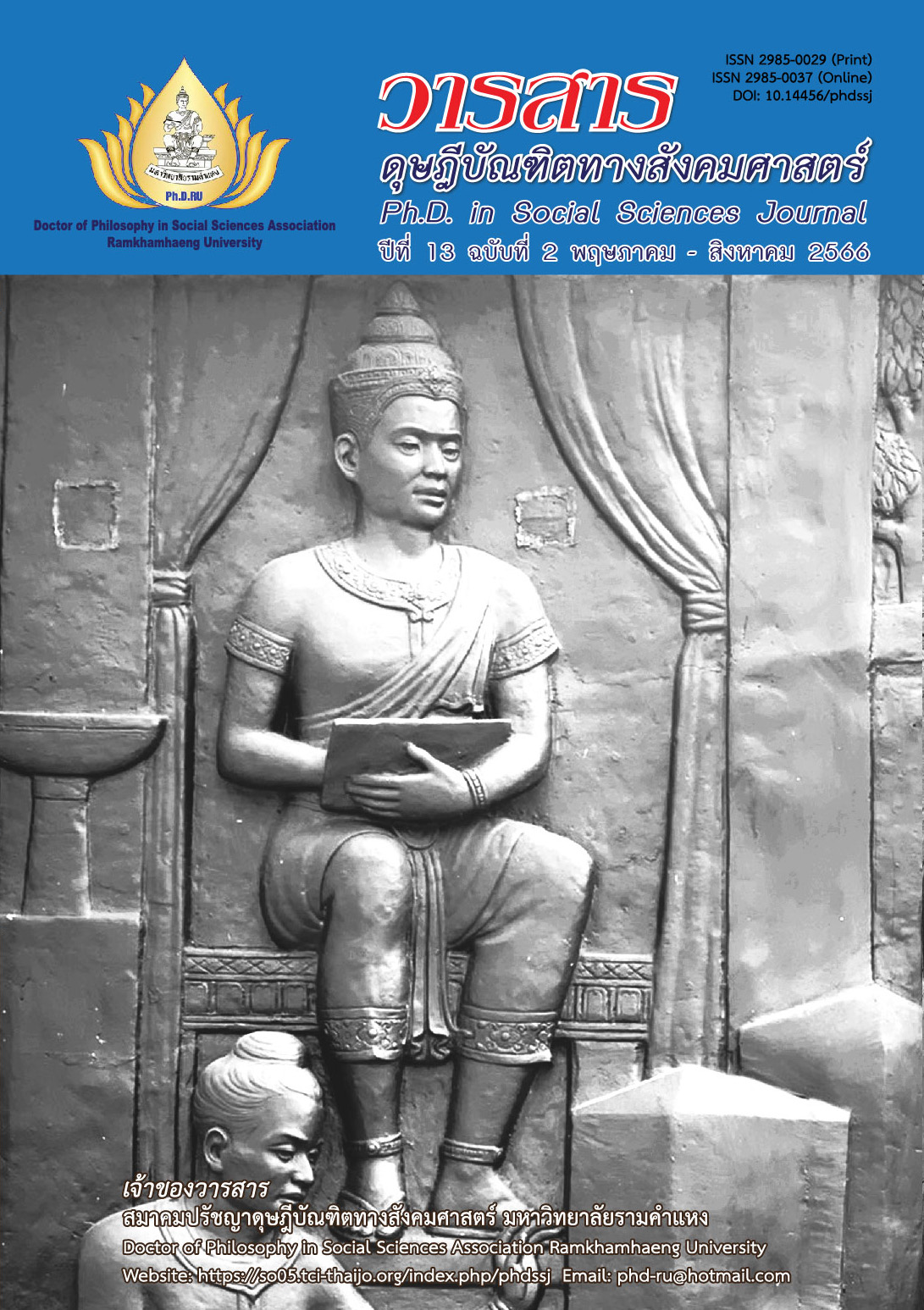Organizational Development Guidelines to Enhance the Competitiveness of Medium-Sized Logistics Companies in the Eastern Economic Corridor
Main Article Content
Abstract
This research article aims to provide organizational development guidelines to enhance the competitiveness of medium-sized logistics companies in the Eastern Economic Corridor by employing a qualitative research approach. The sample group was made up of two groups: (1) A group of 3 business owners from medium-sized logistics service providers and 4 business owners from large organizations that were situated in the Eastern Economic Corridor Zone, for a total of 7 people. (2) A group of 2 experts in logistics and organizational development, so the total sample group was 9 people. As research methods, focus groups and semi-structured interviews were both employed content analysis was used to analyze the data.
Findings are as follows: Competitiveness and sustainability in 6 aspects, consisting of organizational structure, technology and social media, performance business network, organizational strategies and business plans, innovation. The government policy development guidelines according to the perceptions of logistics operators, for example, the government should promote a policy to link electronic documents on imports comprehensive export, amend and improve laws and regulations that are unfavorable to business operations, support logistics companies for small and medium-sized firms with regard to fixed locations, including transportation companies that might not be qualified for benefits. In addition to the government ought to promote the usage of revenue or funding sources, develop one-stop service hubs for the logistics sector, public relations widely known and have access to logistics companies of medium-sized in terms of promotion/privileges thoroughly.
Article Details

This work is licensed under a Creative Commons Attribution-NonCommercial-NoDerivatives 4.0 International License.
Academic articles, research articles, and book reviews in the Ph.D. in Social Sciences Journal are author’s opinions, and not the publisher’s, and is not the responsibility of the Ph.D. in Social Sciences Journal Philosophy Association, Ramkhamhaeng University. (In the case that research is done on human, the researcher has to be trained in Ethics for Doing Research on Human Training and has to produce the evidence of the training).
References
Athikomrattanakul, P. (2017). 10 years: Thai National Logistics Agenda. Retrieved from https://www.logisticstime.net/archives/4137 [In Thai]
Bryan Cave (Thailand) Co., Ltd. (2013). Opportunities, impacts and supporting measures for Thai logistics service businesses from the preparation of free trade area. Ministry of Commerce, Department of Business Development. [In Thai]
Burke, W. W. (1994). Organization development (2nd ed). Addison-Wesley.
Cianni, M., & Steckler, S. (2017). Transforming organizations to a digital world. People & Strategy, 40(2), 14-19.
Department of Business Development (2016). Statistics of registration and registered capital. Retrieved from https://www.dbd.go.th/news_view.php?nid=469412355 [In Thai]
Evangelista, P., Colicchia, C., & Creazza, A. (2017). Is environmental sustainability a strategic priority for logistics service providers?. Journal of Environmental Management, 198(1), 353-362.
Evangelista, P., McKinnon, A., & Sweeney, E. (2013). Technology adoption in small and medium-sized logistics providers. Industrial Management & Data Systems, 113(7), 967-989.
Evangelista, P., Santoro, L., & Thomas, A. (2018). Environmental sustainability in Third-Party logistics service providers: A systematic literature review from 2000-2016. Sustainability, 10(5), 1627.
French, W. L., Bell, C. H. Jr., & Zawacki, R. A. (1978). Organization development: Theory, practice, and research. Business Publications.
García-Sánchez, E., Guerrero-Villegas, J., & Aguilera-Caracuel, J. (2018). How do technological skills improve reverse logistics?: The moderating role of top management support in information technology use and innovativeness. Sustainability, 11(1), 58.
Kolade, O., Obembe, D., & Salia, S. (2018). Technological constraints to firm performance: The moderating effects of firm linkages and cooperation. Journal of Small Business and Enterprise Development, 26(1), 85-104.
Larry, B. G. (1978). Patterns of organization change, in classics of organizational behavior. Cengage.
Lewin, K. (1951). Field theory in social science: Selected theoretical papers. Harper & Row.
Lippitt, R., Watson, J., Westley, B., & Spalding, W. B. (1958). The dynamics of planned change: A comparative study of principles and techniques. Harcourt Bruce & World.
Malecki, E. J., & Veldhoen, M. E. (1993). Network activities, information and competitiveness in small firms. Geografiska Annaler. Series B, Human Geography, 75(3), 131-147.
Office of the National Economics and Social Development Council. (2017). Thailand logistics system development strategic plan No. 3 (2017-2021). Author. [In Thai]
Pettigrew, A. M. (1985). The awakening giant: Continuity and change in imperial chemical industries. Blackwell.
Porras, J. I., & Robertson, P. J. (1992). Organizational development: Theory, practice, and research. In M. D. Dunnette & L. M. Hough (Eds.), Handbook of industrial and organizational psychology (pp. 719-822). Consulting Psychologists Press.
Sweeney, E., Grant, D., & Mangan, D. J. (2018). Strategic adoption of logistics and supply chain management. International Journal of Operations & Production Management, 38(3), 852-873.
Sun, X., Liang, Y., & de Kong, F. (2018). Construction and development strategy of Third-Party cold chain logistics system in Jilin province based on financial risk. IOP Conference Series: Materials Science and Engineering, 452(3), 1-6.
Theppitak, T. (2016). The study on readiness and adaptation of Thai logistics services for opening free trade in service sectors. Retrieved from http://dspace.lib.buu.ac.th [In Thai]
Vlachos, I. P. (2016). Reverse logistics capabilities and firm performance: The mediating role of business strategy. International Journal of Logistics Research and Applications: A Leading Journal of Supply Chain Management, 19(5), 424-442.
Wu, I., & Hu, Y. (2018). Open innovation-based knowledge management implementation: A mediating role of knowledge management design. Journal of Knowledge Management, 22(8), 1736-1756.
Xavier, W., & Martins, R. (2011). Logistic strategy and organizational structure in Brazilian Small and Medium-Sized Enterprises (SMES). Organizations and Markets in Emerging Economies, 2(2), 91-116.


